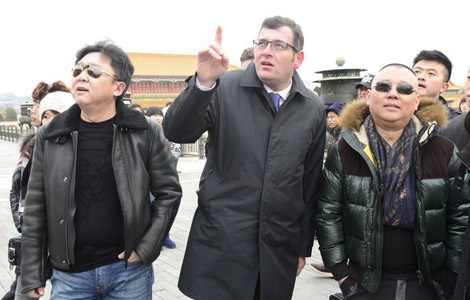
Amway Charity Foundation, a private organization set up by the health-food giant Amway China, pledged 10 million yuan ($1.6 million) to help 150 people achieve their philanthropic dreams in three years.
Thirty youngsters who have the potential to become leaders will also receive 100,000 yuan each to promote the development of charitable organizations, while the 10 best trainees will be sponsored in overseas studies.
Amway Charity Foundation and the China Charity Information Center started the talent training program on Monday in Beijing.
Applications for the program began to be accepted on Tuesday and will continue to be accepted from people who have more than three years of experience in philanthropical work until Jan 20.
To be considered, applicants must be between the ages of 25 and 40 and have worked as team leaders, project managers or founders of nonprofit organizations.
Audie Wong, executive vice-chairman of the Amway Charity Foundation, said the program is meant to enable professionals in NGOs to improve their knowledge and expertise.
Dou Yupei, vice-minister of civil affairs, said during a keynote speech at the opening ceremony for the program on Monday that the shortage of talent has become a "bottleneck" that hinders the development of philanthropy in China.
"At the moment, the supply of talent has fallen behind the needs of the emerging philanthropic field," he said. "And the existing talent pool has various deficiencies, such as a lack of knowledge about running an NGO, of management experience and of an international perspective."
Dou said the training programs, which were initiated by charitable foundations and NGO incubators, are important ways to foster talent, especially when formal educational programs on philanthropy are still rare in China.
Wang Yi'ou, founder and director of China-Dolls, an NGO in Beijing that aims to help people who have rare diseases, applauded the steps charitable foundations have taken to invest in people rather than fixed charitable projects.
"Our organization's biggest problem is talent," she said on Monday, adding that she spent the last two years unsuccessfully trying to recruit a project officer who would work on fundraising.
"A lot of people came in for interviews, but most gave up on the idea of working with an NGO like China-Dolls after they saw that we work in a residential building and can barely pay them enough to survive on."
Most of her 12 employees in Beijing and East China's Shandong province are young people who will probably leave after they gain some work experience, she said.
"We're in great need of an experienced staff," Wang said. "But the reality is that only fresh graduates accept the job offers, and then they treat them as a place to stay for a bit before finding jobs in the private sector or in government departments."
Liu Zhouhong, secretary-general of the Narada Foundation, a private charity in Beijing, said the low salaries and meager benefits are the chief causes of the high rate of turnover at philanthropies.
Employees of nonprofits earned on average about 740 yuan a month in 2011, less than half of what their counterparts in the private sector earn and a quarter of what those in the public sector did, he said, citing the National Bureau of Statistics.
In 2010, the Narada Foundation took part in a study that looked at 5,000 charitable organizations and found that less than 20 percent of them provide social insurance to their employees, Liu said.
It also concluded that the staffs at more than 60 percent of the organizations had seen some turnover that year and that fewer than a third of those who quit said they would hunt for jobs at nonprofits, Liu said at a forum on the development of talent in philanthropies.
Meng Zhiqiang, deputy director of the Ministry of Civil Affairs' Social Worker Department, said the government has been trying to improve the polices and regulations governing philanthropies to make it easier for those organizations to attract talented employees.
The government still has "promising prospects and enough room" to cultivate talented workers for NGOs, Meng said, saying it can improve wage standards and tax deduction policies.







